Matcha Tea For Weight Loss – How It Helps Burn Fat And How To Prepare It
Understand how this traditional Japanese beverage may support your weight loss goals.
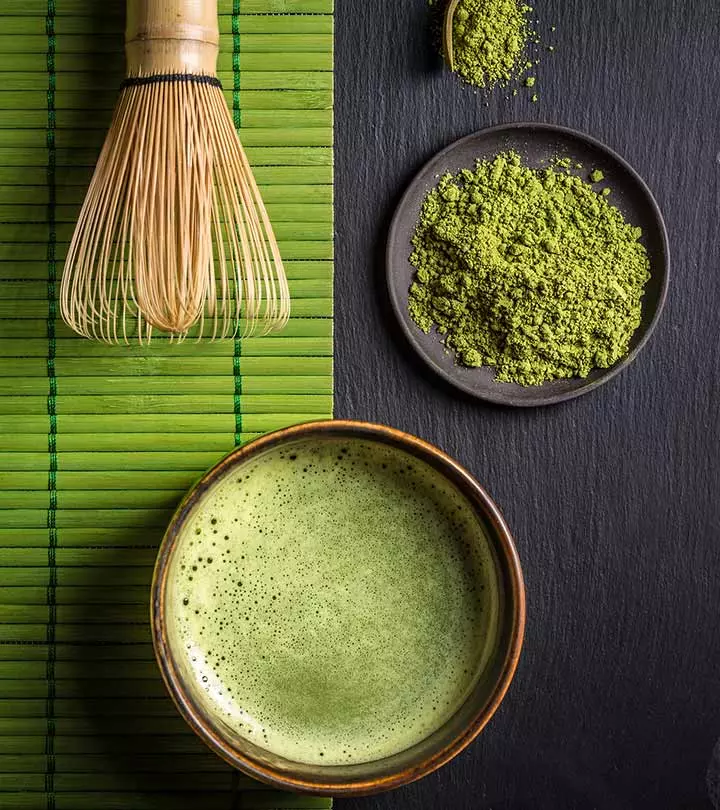
Image: iStock
Everybody is raving about matcha tea for weight loss. This Japanese powdered green has 10x more antioxidants. Typically used in Japanese tea ceremonies, making this tea your new weight-loss elixir can help you flush out toxins, boost metabolism, and shed the flab. So, how does this tea work better than regular green tea? Want to know the secret behind the weight-loss power of Matcha tea? Read this post to know how Matcha tea helps lose weight, how to make it, and its benefits. Scroll down!
In This Article
Highlights Of The Article
- Matcha Tea – History And Processing
- How Matcha Tea Aids Weight Loss
- How To Prepare Matcha Tea At Home For Weight Loss
- How Many Cups Of Matcha Should You Drink?
- Where To Buy Organic Matcha Tea
- Matcha Tea Vs. Green Tea
- Health Benefits Of Drinking Matcha Tea
- Matcha Tea Side Effects
- Who Should Avoid Drinking Matcha Tea?
- Weight Loss Tips
Matcha Tea – History And Processing
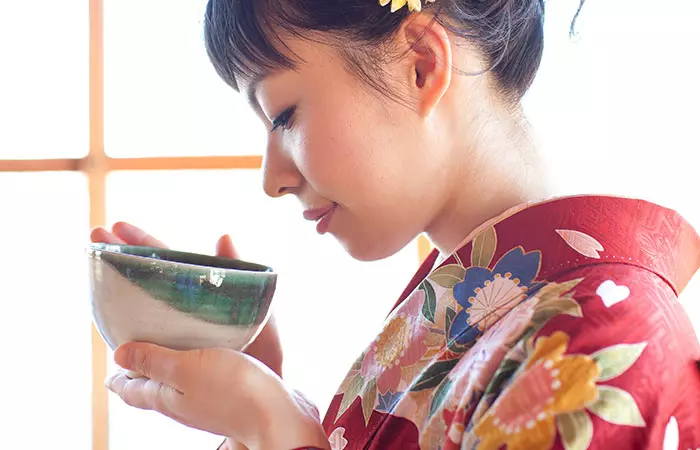
This powdered green tea was discovered in China during the reign of the Tang Dynasty. But it was the Buddhist monks who brought matcha tea to Japan. It helped them meditate better, and as time passed, it became popular. Over the past 1000 years, matcha has become an integral part of the Japanese culture. It is used in the Chado ceremony, where two grades of matcha are used – Koicha (thick) and Usucha (thin). In this ceremony, the host prepares matcha tea using the traditional method of whisking the tea with a bamboo whisk.
The processing of matcha is what makes it so special. The best quality of matcha tea plant is grown in the Uji region of Japan. The tea plants are covered with bamboo shades, allowing only 20% of sun rays to reach the plants. This process helps increase the chlorophyll levels of the leaves. Then, the leaf buds are plucked, steamed, dried, and stone ground to produce matcha tea. How does this tea aid weight loss? Find out next.
How Matcha Tea Aids Weight Loss

We have already heard of the many benefits of drinking green tea for weight loss. Among all green teas, this powdered green tea formula (matcha tea) is popular as it is known to work quickly and gives visible results. Want to know how it aids in weight loss? Read on.
Low In Calories
Matcha tea is low in calories – 2 teaspoons contain (4 g) contain about 15 calories (1). It also has significant antioxidant potential due to its high concentration of Vitamin C (44.8 mg/L), polyphenols (1765.1 mg/L), and flavonoids (1968.8 mg/L) (2). So, even if you have a little more than 4 g of the tea, you will not consume too many calories. And as you know, fewer the calories you consume, lesser the chances of those calories not getting used up and being stored as fat.
Rich In Antioxidants
Matcha tea is obtained from the same plant as green tea, Camellia sinensis. And, like green tea, matcha tea also contains the most abundant and proactive antioxidant, Epigallocatechin Gallate (EGCG). Research concluded that it is a rich source of phytonutrients, such as polyphenols, amino acids, vitamin C, and rutin (flavonoids) (2). And that’s because when you drink the tea, you consume the whole leaves, unlike most teas where you discard the leaves after steeping them in hot water for a few minutes. The antioxidants help flush out toxins, boost immunity, and reduce inflammation, which helps prevent weight gain and accelerates weight loss.
Boosts Metabolism
If you are trying to lose weight, you should pay attention to your metabolic rate. If your metabolic rate is slow, you will not be able to shed the fat, no matter how little you eat. Matcha green tea has been found to boost or speed up your slacking metabolism. The catechins present in the tea help improve the metabolic rate during and after exercise (3).
May Burn Fat
Fat burning is a biochemical process of breaking down large fat molecules into smaller triglyceridesi A type of converted fat stored in the blood and used by the body to provide energy in between meals. , and these triglycerides must be used up or excreted. Matcha tea is rich in catechins that increase the body’s thermogenesis from 8-10% to 35-43%. Moreover, drinking this tea can improve your exercise endurance and help you burn or mobilize fat (4).
Balances Blood Glucose

A constant spike in blood glucose or blood sugar levels can put you at the risk of being insulin resistanti Lack of response to the insulin hormone, which results in increased blood sugar levels and a risk of developing diabetes. and diabetic. Matcha tea helps reduce and regulate blood sugar levels as it contains a good amount of dietary fiber, which keeps you full for a long duration and prevents you from overeating (5). And when you don’t overeat, your glucose levels will not spike. This, in turn, will also prevent you from being prone to type 2 diabetes.
Lowers Stress
Stress triggers the secretion of cortisol, the stress hormone. When the cortisol levels are constantly high, your body goes into a state of inflammation. You start feeling fatigued, tired, restless, all at once. And the worst side effect of being stressed out is weight gain, especially in the belly region. Matcha tea is loaded with antioxidants that help scavenge the harmful oxygen radicals, lower inflammation, and prevent weight gain (6).
Provides Energy
Matcha tea also helps boost the energy levels, increases alertness, and makes you more proactive (7). The more active you feel, the more active you will be. This prevents you from being lazy, helps maintain hydration, increases your stamina and endurance levels, and helps in weight loss.
Reduces Cholesterol
Matcha tea is the richest source of EGCG, an antioxidant that is found in most teas. Scientists found that EGCG helped reduce bad cholesterol levels in laboratory rats when they were fed high cholesterol food for 30 days (8). The underlying mechanism may be because EGCG inhibits bad cholesterol absorption (9).
Helps In Detoxification
Bad eating and lifestyle habits can lead to toxic build-up in your body. And toxic build-up is one of the reasons for weight gain. So, you need to detoxify your body every day. And what can be better than drinking matcha tea, which is loaded with antioxidants that help flush out the harmful free oxygen radicals (10)? Detoxification with matcha tea will help you lose weight, prevent constipation, improve digestion, build immunity, and boost your overall health.
- May Reduce Cancer Risk
Matcha tea is known for its high concentration of EGCG (epigallocatechin gallate) and quercetin, compounds also found in green tea that are popular for their potent anticancer potential. These antioxidants demonstrate efficacy in controlling cancer by stopping the growth of cancer cells, diminishing both their viability and proliferation (11). However, more research is warranted in this regard.
Matcha tea provides a convenient and enjoyable means to incorporate these beneficial compounds into your daily routine, offering the potential to enhance your overall health. This flavorful tea can be had every day, pairs well with any meal of the day, and can be a perfect addition to any diet.
Patrick Van Negri, a blogger, has tried Matcha tea and wrote his experience in a blog post. He says “Matcha is now an essential part of my morning routine. I use it without fail every time I go to the gym, have a demanding workload, am studying, working long hours or any other physical or mental challenges which I am able to surpass with a little help from Matcha (i)”.
How To Prepare Matcha Tea At Home
Preparing matcha tea is simple and is similar to making a cup of green tea.
Here’s a video of how to prepare matcha tea the traditional way.
Lose weight quickly and naturally with matcha green tea. Tune into this insightful video to learn how to get your desired physique and youthful skin easily.
What You Need
- Chawan – traditional Japanese Matcha tea bowl
- Chasen – Bamboo whisk
- Chashaku – Bamboo scoop or spoon
- Sifter
Ingredients
- ½ teaspoon Matcha green tea powder
- 2-3 ounces of water at 185o F
How To Prepare Matcha Tea
- Sift half a teaspoon or two bamboo scoops of matcha green tea powder and add it to the tea bowl.
- Carefully pour the hot water.
- Use the bamboo whisk to whisk the matcha, using a “W” motion. Do this until a layer of froth has formed.
- Slow down the whisking and slowly lift the whisk from the center. And, it’s ready!
 Quick Tip
Quick TipMatcha tea offers a world of flavor possibilities.
- Elevate your matcha experience by adding a twist to your usual latte. Add some matcha to this warm and comforting drink, that usually consists of steamed milk and a touch of sweetness.
- Opt for a refreshing iced matcha! Matcha powder is mixed with cold water or milk and served over ice.
- If you are looking for a more substantial drink, consider a matcha smoothie. Bend matcha powder with fruits, yogurt, and other healthy ingredients to create a delicious and nutritious beverage.
With these variations, you can enjoy the benefits of matcha in a way that suits your taste preferences and lifestyle.
Now that was simple, wasn’t it? Making matcha tea can be fun and relaxing. But how many cups should you drink to lose weight? Find out in the next section.
How Many Cups Of Matcha Should You Drink?
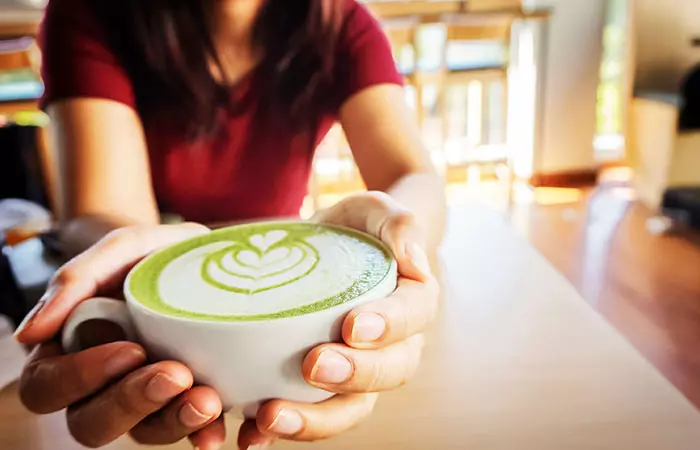
It is safe to drink about 3 cups of matcha green tea per day for weight loss. Since 1 cup of matcha contains about 70 g caffeine (1 cup of coffee contains 100 g caffeine), we recommend you not to overdrink it as you may experience an unpleasant spike in energy levels and withdrawal symptoms.
Where To Buy Organic Matcha Tea
You can buy matcha tea online or at a tea shop that sells good grade matcha tea.
 Fun Fact
Fun FactMatcha Tea Vs. Green Tea
Yes, there are multiple green tea benefits. However, matcha tea contains about 10 times more antioxidants than green tea. Plus, it tastes great. Having said that, I would also like to add that matcha tea is great, but so is green tea. You can use both, but yes, you will see quick results with matcha tea.
So, does matcha tea only help in weight loss? Or are there other benefits? Let’s find out.
Health Benefits Of Drinking Matcha Tea
Epigallocatechin gallate (EGCG) is an antioxidant found in most teas. However, since matcha tea is produced by grinding the whole tea leaves, and you drink the powdered tea without discarding the leaves, you get a lot more of the antioxidant as compared to any other tea. And it helps improve your health in the following ways:
- It helps flush the toxins out.
- EGCG helps in stress relief and lowers blood pressure.
- Keeps your heart healthy by lowering bad cholesterol levels and improving overall blood lipid profile.
- Matcha tea is also rich in dietary fiber, which keeps you full for a long period.
- This tea will improve hair and skin health.
- Since it helps lower blood sugar levels, it prevents the risk of diabetes.
- Helps to detoxify the liver.
Drinking matcha tea can surely make you lose weight and improve your health. But what can happen if you go overboard with it?
Matcha Tea Side Effects

If you consume more than 5 cups of matcha tea per day, you may experience the following:
- Nausea
- Constipation
- Anxiety
- Insomnia
- Headache
- Diarrhea
- Heartburn
Who Should Avoid Drinking Matcha Tea?
Pregnant women and children should avoid drinking matcha tea. Also, always consult your doctor before drinking matcha tea for weight loss. He/She will be able to give you an expert opinion depending on your medical conditions, medical history, age, weight, current medications, etc.
Now, you know all about matcha tea for weight loss. But what good is it if all its goodness just gets oxidized? Yes, matcha tea is prone to quick oxidationi A chemical process that takes place when a substance comes in contact with oxygen or an oxidized substance, resulting in a brown tinge. , and hence, you must know the right way to store it.
How To Store Matcha Tea
Here are the steps you can follow to store matcha and prevent it from oxidizing:
- Wash an airtight container with soap water to prevent contamination.
- Let it dry in the sun.
- Scoop out the matcha tea powder and transfer it to the airtight container.
- Store it in a cool and dark cabinet in the refrigerator.
- If you haven’t opened the matcha tea pack yet, store it in the fridge.
Before I conclude, go through these weight loss tips that are going to help you lifelong.
Weight Loss Tips
- Watch what you are eating – avoid junk and processed foods.
- Consume five different veggies every day.
- Consume three types of fruits every day.
- Drink at least 3 liters of water per day.
- Control your portions, even with veggies and fruits.
- Add protein to every meal.
- Consume full-fat milk.
- Add healthy fats to your diet.
- Do a mix of cardio, HIIT, and strength training.
- Have a protein drink if you are not getting enough protein from whole foods.
- Get 7 hours of sleep every night.
- Avoid late night snacking.
- Enjoy a cheat day every week (only if you have earned it).
- Walk and ride a bicycle.
- Try to stay stress-free. Practice yoga and meditation.
Key Takeaways
- Matcha possesses antioxidants that can help remove impurities, strengthen the immune system, and thus speed up weight loss.
- Matcha tea can also help boost energy, improve your overall mood, and suppress appetite, which can result in weight loss.
- Ensure to consume three cups of matcha tea each day.
- Do not drink more than five cups each day as you may experience side effects like headache, anxiety, constipation, insomnia, etc.
Infographic: Matcha Tea: Benefits For Weight Loss And Side Effects
Losing weight in a healthy way can be beneficial in the long run. Small habits, such as drinking water throughout the day, eating fewer carbs, and not skipping breakfast, can make a real difference. However, you can also supplement it by drinking matcha tea, which can accelerate the pace of your weight loss. It is also an excellent source of antioxidants that can help detoxify the body and give a boost to the immune system. Check out the infographic below to learn more about matcha tea and its benefits and potential side effects.

Illustration: StyleCraze Design Team
The best quality matcha tea plants are grown in the shade of bamboo plants so that only 20 percent of sunlight reaches them. This makes them increase chlorophylli A natural compound found in plants that gives them their pigment and helps in the photosynthesis process. and L-theanine production, giving them their intense green color. While traditionally it is a drink monks took to detox and meditate better, matcha tea for weight loss has gained popularity in the last few years. It is low in calories, and rich in antioxidants. In addition, it increases thermogenesis (fat burning process), boosts metabolism, reduces stress, and balances blood sugar levels— all of which help with weight loss. Matcha tea is easy to prepare and tastes great, but you should restrict your consumption to 3 cups a day as overconsumption can lead to side effects of excess caffeine intake such as nausea, anxiety, constipation, and headaches.
Frequently Asked Questions
Is matcha tea expensive?
Yes, it is expensive, but you will use half a teaspoon to make one cup of matcha tea. So, you can use a pack of matcha tea for a long time. The shelf life of this tea is 6-12 months, and it has innumerable health benefits.
How much caffeine is present in Epic Matcha?
Epic Matcha tea contains 29-37 mg of caffeine per serving.
Can you use cold water to make matcha tea, or does it have to be hot?
You can use both cold and hot water to make matcha tea. Make sure the water is below the boiling point if you want to make hot matcha tea.
Which is better – culinary grade or ceremonial grade?
Both taste great. It depends on whether you like matcha in the traditional Japanese form or the bitter-tasting (like coffee) culinary grade variant.
Is it okay to drink matcha every day?
Yes, it is okay to drink matcha tea every day. There is no evidence to suggest that regular consumption of matcha can have health repercussions.
Does matcha stain teeth?
Matcha contains tannins which may cause brown discolorations on the teeth. However, more research is warranted to support this claim (12).
Can I drink matcha at night?
As matcha contains caffeine, it is advisable to not consume it before bedtime.
Does matcha make you poop?
Yes, matcha tea can make you poop as it is rich in fiber, antioxidants, and caffeine. It keeps you hydrated and aids in easy bowel movement, thus maintaining a healthy digestive system.
Illustration: Matcha Tea For Weight Loss – How It Helps Burn Fat

Image: Stable Diffusion/StyleCraze Design Team
Personal Experience: Source
StyleCraze's articles are interwoven with authentic personal narratives that provide depth and resonance to our content. Below are the sources of the personal accounts referenced in this article.
i. HOW MATCHA GREEN TEA ENHANCED MY LIFEhttps://medium.com/@PatrickVanNegri/how-matcha-green-tea-enhanced-my-life-e65dd21007f
References
Articles on StyleCraze are backed by verified information from peer-reviewed and academic research papers, reputed organizations, research institutions, and medical associations to ensure accuracy and relevance. Read our editorial policy to learn more.
- MATCHA GREEN TEA POWDER MATCHA GREEN TEA
https://fdc.nal.usda.gov/fdc-app.html#/food-details/2386020/nutrients - Antioxidant Properties and Nutritional Composition of Matcha Green Tea
https://www.ncbi.nlm.nih.gov/pmc/articles/PMC7231151/ - An Overview on How Exercise with Green Tea Consumption Can Prevent the Production of Reactive Oxygen Species and Improve Sports Performance
https://www.ncbi.nlm.nih.gov/pmc/articles/PMC8750450/ - Green Tea Intermittent Sprinting Exercise and Fat Oxidation
https://www.ncbi.nlm.nih.gov/pmc/articles/PMC4517022/ - Therapeutic Benefits and Dietary Restrictions of Fiber Intake: A State of the Art Review
https://www.ncbi.nlm.nih.gov/pmc/articles/PMC9268622/ - The therapeutic potential of matcha tea: A critical review on human and animal studies
https://www.ncbi.nlm.nih.gov/pmc/articles/PMC9792400/ - The therapeutic potential of matcha tea: A critical review on human and animal studies
https://www.ncbi.nlm.nih.gov/pmc/articles/PMC9792400/ - Epigallocatechin gallate improves serum lipid profile and erythrocyte and cardiac tissue antioxidant parameters in Wistar rats fed an atherogenic diet
https://pubmed.ncbi.nlm.nih.gov/18485145/ - Epigallocatechin gallate improves serum lipid profile and erythrocyte and cardiac tissue antioxidant parameters in Wistar rats fed an atherogenic diet
https://pubmed.ncbi.nlm.nih.gov/12873714/ - Health Benefits and Chemical Composition of Matcha Green Tea: A Review
https://www.ncbi.nlm.nih.gov/pmc/articles/PMC7796401/ - Effects of green tea matcha tea and their components epigallocatechin gallate and quercetin on MCF‑7 and MDA-MB-231 breast carcinoma cells
https://pubmed.ncbi.nlm.nih.gov/30320348/ - Discoloration of dental pellicle by tannic acid
https://pubmed.ncbi.nlm.nih.gov/271453/
Read full bio of Aakriti Arora
Read full bio of Ravi Teja Tadimalla
Read full bio of Payal Karnik






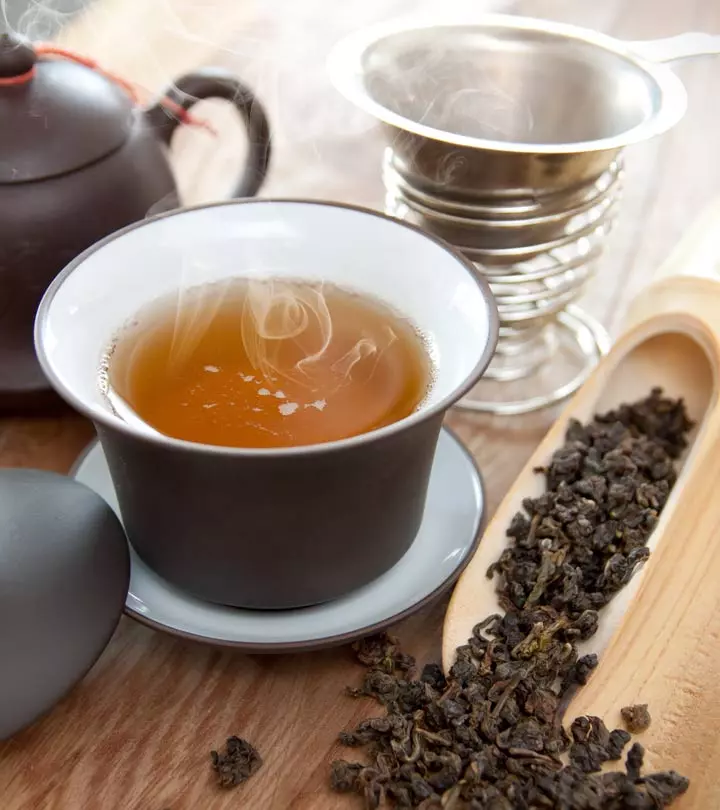

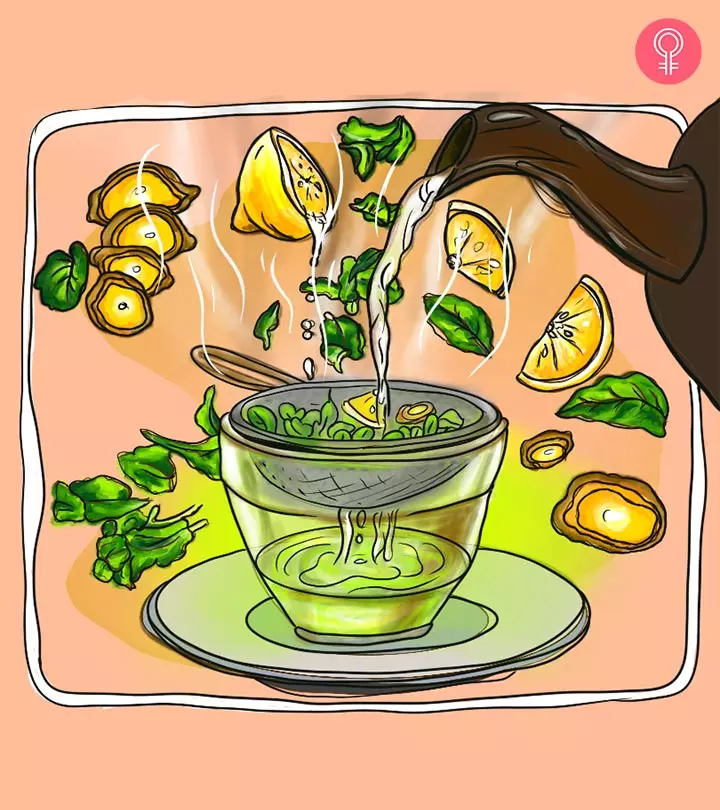
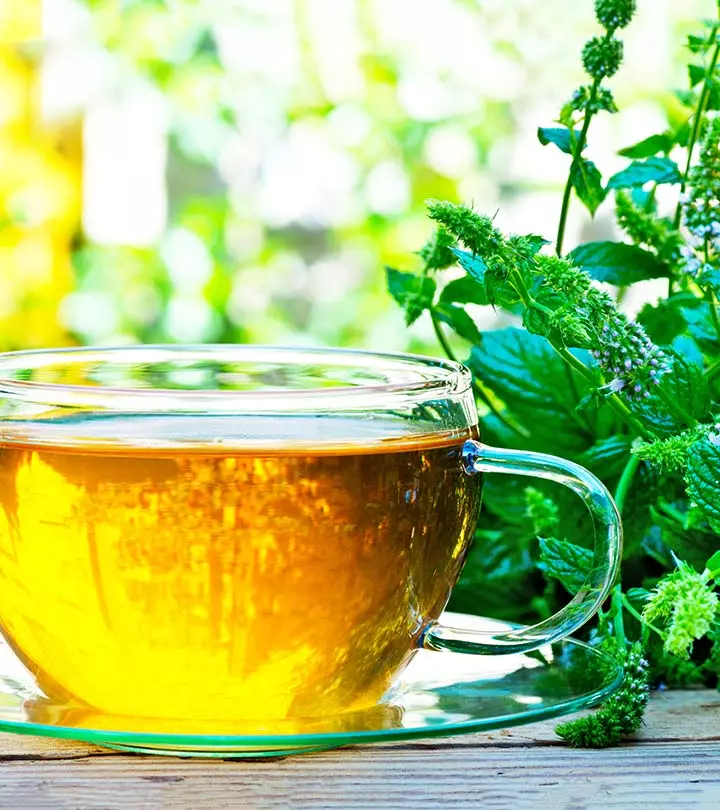

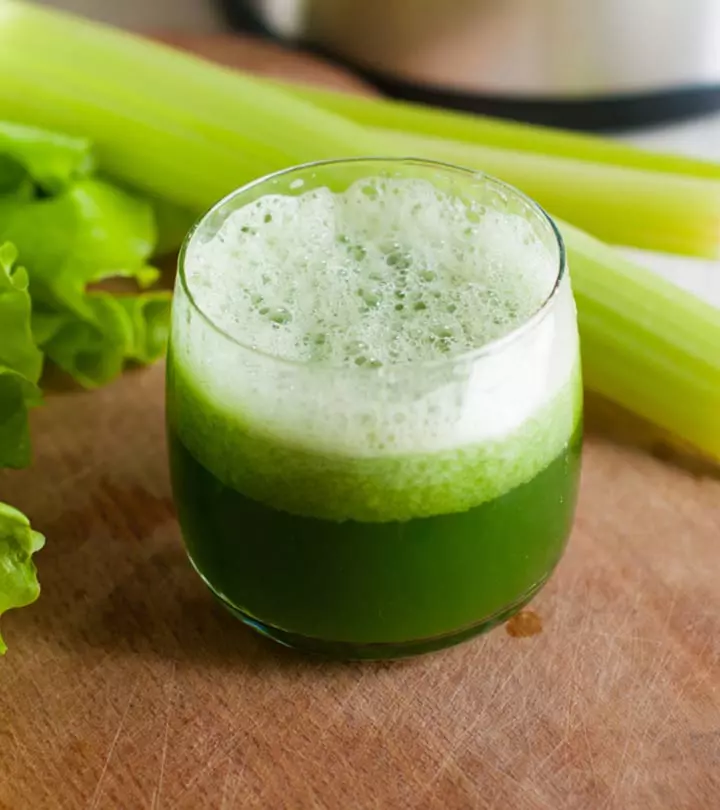







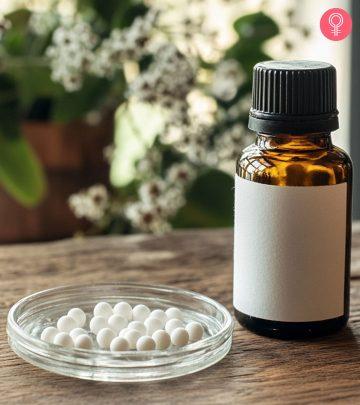

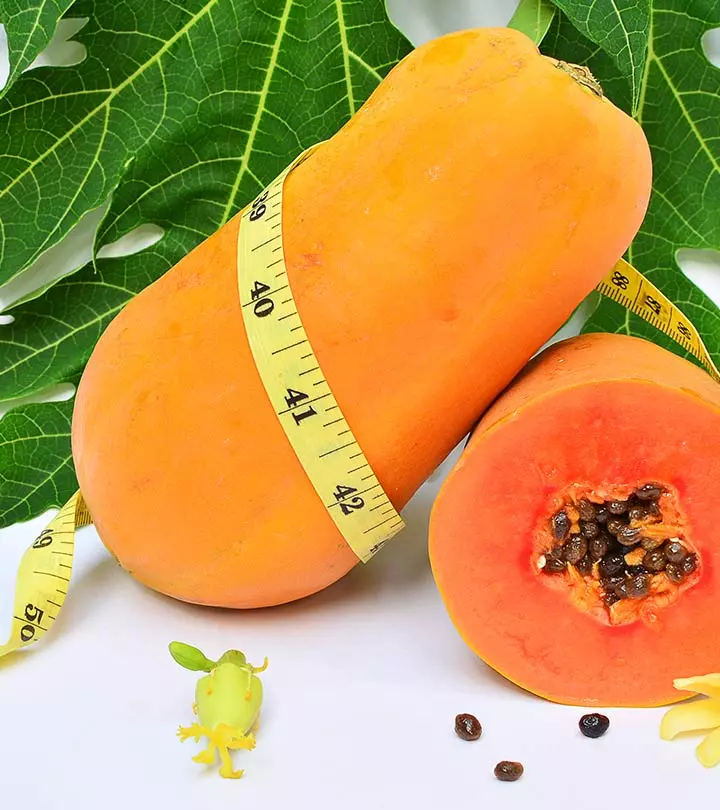



Community Experiences
Join the conversation and become a part of our empowering community! Share your stories, experiences, and insights to connect with other beauty, lifestyle, and health enthusiasts.